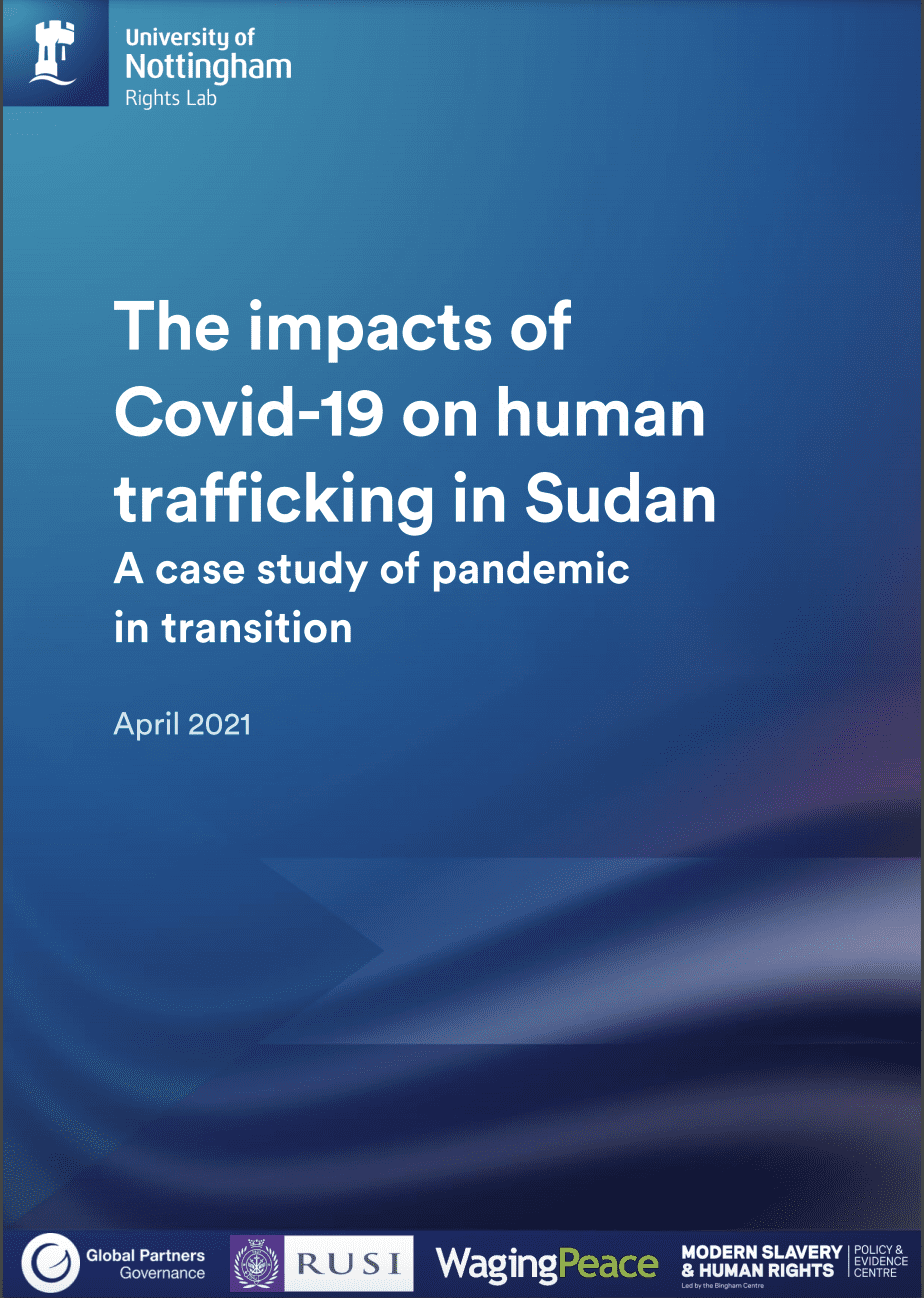
The impacts of Covid-19 on human trafficking in Sudan: A case study of pandemic in transition
Executive Summary
This report is the produce of an investigation into the impacts of Covid-19 on human trafficking and modern slavery in Sudan–a site of current and ongoing political transition and a critical source, destination, and transit country for people experiencing or at risk of human trafficking. Due to the unfolding nature of the pandemic, the impacts on human trafficking in transitional and post-conflict contexts like Sudan remain under-explored. These contexts are critical for interrogation, not only because of high levels of existing vulnerability to human trafficking, but because transition provides an opportunity to embed robust evidence-based antislavery in new structures of governance.
This study combined systematic evidence review with semi-structured key informant interviews, a stakeholder survey, and survivor focus group to understand the emerging impacts of Covid-19 on human trafficking in Sudan. Participants included representatives of governmental, non-governmental, and inter-governmental organisations, as well as Sudanese survivors based in the UK. Research was conducted rapidly over a three-month period (January-March 2021), with the Covid-19 crisis ongoing and extending beyond the life of the study. Evidence presented is therefore nascent, and further research is needed to understand the medium and long-term impacts of Covid in Sudan.
The pandemic in Sudan
As of February 2021, Sudan had reported 27,443 cases and a total death count of 1,830 from Covid-19. Limitations on access to testing equipment led to limited testing and as a result a positivity rate of nearly 55% with stark differences in the fatality rate. In Khartoum the fatality rate was 3.8% while in Northern Darfur 31.7%. The Government of Sudan implemented strict lockdown measures shortly after the first positive case in March of 2020, which included border closures, quarantine, limitations on intrastate movement, governmental closures, restrictions on public gathering and social distancing at employers. Most restrictions had been lifted as of January 2021, although schools remained closed for fourteen months, and many healthcare centres were still shuttered. Sudan received support to mitigate the crisis from several international partners, including Turkey, the UAE, and Egypt in addition to the World Bank and World Food Program.
Key findings
The study found that the pandemic has increased individual risks and vulnerabilities to human trafficking in Sudan. Rather than fundamentally reshaping vulnerabilities in Sudan, the pandemic exacerbated existing individual, community, structural, and environmental risk factors which drive human trafficking and modern slavery within, through, and from the country. While many of the criminal networks, perpetrators, and methods employed in trafficking have remained the same, the dynamics of vulnerability and routes taken have shifted as a result of the pandemic. It has also disrupted the capacity of criminal justice, governance, and humanitarian organisations to provide services to survivors or to prosecute perpetrators. These disruptions further exacerbate the effects of the pandemic and Covid-19 mitigation strategies on already vulnerable groups.
The lack of resources at the governmental level to tackle these issues represents a substantial challenge. However, the beacon of hope identified by interviewees was that collaborative strategies to combat human trafficking and modern slavery were put in place by governmental actors prior to the pandemic. Chief actors in government were identified by interviewees as capable advocates and governors, willing to act on the strategic goals. The hope was that this momentum would continue post-pandemic. However, it must overcome the barriers of limited resources and lack of institutional memory within governance structures. External resourcing and support were therefore identified as crucial to effective anti-trafficking governance and action in Sudan.
Impacts of Covid-19 at the household and individual level
Restrictions on mobility and social gathering have adversely affected income generation activities, particularly in the informal sector. Refugees, women, and internally displaced persons (IDPs) are most likely to be employed within this sector and were thus disproportionately affected by the closure of businesses and livelihoods.
Increased poverty or economic precarity has forced families to consider risky coping strategies and increased vulnerability to exploitation. In particular, refugees and displaced populations were more likely to consider onward migration through increasingly risky routes involving trafficking or smuggling. Mobility restrictions also increased the isolation of women, particularly domestic workers, who were more likely to experience abuse and exploitation as a result.
Impacts of Covid-19 on governance
The pandemic interrupted normal functioning of government, impeding efforts to combat trafficking. Border closures all but ended cross-border collaborative anti-trafficking efforts. In addition, the pandemic reduced policing of crimes and shut down courts and criminal prosecution of perpetrators. Third sector organisations who typically supply resources to combat trafficking to the government, or provide for survivors through direct services, lost their ability to do as a result of the economic toll of the pandemic and lockdown measures.
Impacts of Covid-19 on institutions
Public and civil institutions were closed by pandemic restrictions. This included schools, public health clinics, counselling services, and safe houses. This limited the ability of vulnerable individuals to seek help, survivors to find care or support, and institutions to monitor the well-being of the populations they served.
Read more here.
